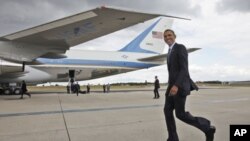President Barack Obama has returned from his six-day tour of four European countries. The president spent much of the trip working to reaffirm that the U.S.-European alliance still matters.
President Obama did not sign any major agreements or announce any sweeping new policies during his week in Europe.
But he seemed to accomplish his primary goal on the trip, reassuring Europeans that the transatlantic alliance is still important to the United States.
Wars in Iraq and Afghanistan, upheavals in the Middle East, booming economies in Asia and crises at home have occupied much of Mr. Obama’s attention so far in his presidency.
Furthermore, the Obama administration has declared that it considers the G20 economic forum, with member countries from every continent, to be more important than the Euro-centric G8.
Mr. Obama started his diplomacy mission in Ireland. He met with the country’s leaders, drank a beer at a pub in his ancestral home town of Moneygall, and proclaimed his Irish heritage before tens of thousands of people in Dublin.
He did not commit U.S. financial support to Ireland’s struggling economy, but pledged moral support.
Next for the president was a visit to Britain. The U.S. and Britain have been the closest of allies since the 19th century, and they are the world’s two largest trading partners.
But a series of protocol gaffes and perceived snubs going back to Mr. Obama’s inauguration had called into question the health of what is often called “the special relationship.”
The British afforded the president the rare honor of a state visit, including an opportunity to speak before Parliament in 900-year-old Westminster Hall. There, Mr. Obama debunked the argument that emerging economies in China, India and Brazil will replace the U.S. and U.K. as world leaders. “That argument is wrong. The time for our leadership is now. It was the United States and the United Kingdom and our democratic allies that shaped a world in which new nations could emerge and individuals could thrive. And even as more nations take on the responsibilities of global leadership, our alliance will remain indispensable to the goal of a century that is more peaceful, more prosperous and more just," he said.
The president and British Prime Minister David Cameron discussed numerous issues, including Libya. The prime minister appears to favor a more assertive approach to trying to oust Libyan leader Muammar Gadhafi, while Mr. Obama is calling for more caution.
But the two leaders made a show of strengthening their personal bond, playing doubles table tennis with schoolchildren in London, and serving hamburgers at a barbecue at 10 Downing Street. Also, Mr. Obama and Britain’s Queen Elizabeth both made sure to use the phrase “special relationship” when toasting each other at a Buckingham Palace state dinner.
President Obama went to the G8 economic summit in Deauville, France, seeking financial help for Egypt, Tunisia, and other Arab nations showing the promise of democracy.
The group of major industrial democracies did not make a concrete commitment, but said $20 billion may be offered to Egypt and Tunisia for reform projects.
In Deauville, Mr. Obama was unable to convince Russian President Dmitry Medvedev that the proposed U.S. missile defense system would not be targeted at Russian missiles.
Mr. Medvedev did, however, agree to support efforts to drive Muammar Gadhafi from power, helping to further isolate the Libyan leader.
In Warsaw, Mr. Obama reassured leaders that improved U.S. relations with Russia do not mean a lessening of Washington’s commitment to protect fellow NATO alliance member Poland. “What we want to do is to create an environment in this region in which peace and security are a given. That is not just good for this region, it is good for the United States of America. And we will always be there for Poland," he said.
The president also agreed to send U.S. F-16 fighter jets and C-130 transport planes to Poland for training, and to ask Congress to ease visa requirements for Polish visitors to America.
As on the rest of his trip, Mr. Obama spent much of his visit to Warsaw saluting his hosts.
He laid wreaths at Poland’s tomb of the unknowns, at a memorial for those killed by Nazis at the Warsaw ghetto, and at a memorial for the late President Lech Kaczynski and other victims of last year’s Smolensk plane crash.
The president also met with a group of leaders of the Solidarity trade union that pushed for democracy in Poland.
And he reminded Europeans that at each stop in his tour, he had affirmed that America’s transatlantic alliance is the cornerstone of Washington’s engagement in the world.




